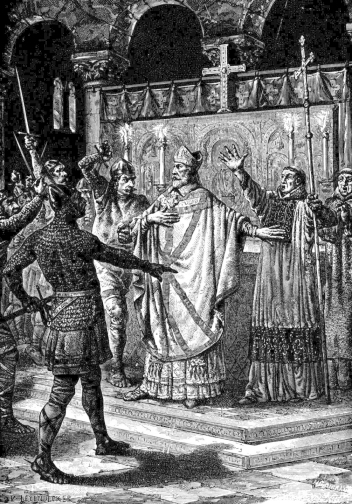 Back in 2002, I came across an old copy of Hilaire Belloc's book The Old Road. It was being sold off for 40p by my local library, along with many of their other books most worth reading, and I bought it and devoured his journey along the old Pilgrim's Way.
Back in 2002, I came across an old copy of Hilaire Belloc's book The Old Road. It was being sold off for 40p by my local library, along with many of their other books most worth reading, and I bought it and devoured his journey along the old Pilgrim's Way.Reading Belloc changed my outlook on many things. He was a former Liberal MP who left the party and launched one of those Liberal breakaway movements - like the Greens - this one called the Distributist League.
I've written elsewhere about the links between the Liberals and the Distributists, but it is a diversion and a controversial one, so won't do so again now.
The Old Road had been published in 1904, and Belloc described himself setting out from Winchester on old St Thomas Becket Day, 31 December. I realised that if I did the same that year, I was probably leaving exactly a century after Belloc's own journey. And so it was that, on 31 December 2002, bearing umbrellas on a very drizzly day, Sarah and I set off past the ruins of Hyde Abbey and along the flooded route towards the Winchester bypass.
Every few months we would do a little more, eventually with a buggy and a baby, and then with two children. On Palm Sunday, we finally reached the end of the pilgrimage. We were even blessed by a resident chaplain in Canterbury Cathedral.
At the end of the book, Belloc writes:
"In the inn, in the main room of it, I found my companions. A gramophone fitted with a monstrous trumpet roared out American songs, and to this sound the servants of the inn were holding a ball. Chief among them a woman of a dark and vigorous kind danced with an amazing vivacity, to the applause of her peers. With all this happiness we mingled..."
The awkward transition back to modern life, from a medieval dream, which Belloc hints at rather strangely here, I have also now been through. But part of the dream has stayed with me - more than part actually, but this is the relevant bit. It is the meaning of the cult of Thomas Becket, the murdered archbishop, and how much we need something similar now.
Because Becket became a symbol of spiritual resistance to conventional authority. That was the ideal which united all those pilgrims over three and a half centuries. It was a celebration, not just of resistance, but of the possibility of supra-national authority. Or a moral appeal beyond the king and parliament.
It would be too simple to say that this role is covered by the European Convention or the European Union, though they are the flawed successors of the Roman Catholic Church - it is no coincidence that Brussels now plays the same role in the English psyche as Rome once did, irritatingly interfering until we need it.
Becket was not just resisting civilian authority, he was murdered by the king. In these days, the comparison is with Dietrich Bonhoeffer or Oscar Romero, and other spiritual leaders murdered by governments the world over.
You can see why Henry VIII, the great tyrant, was so keen to seize Becket's shrine and how frustrated he must have been that Becket's bones eluded him.
The trouble is, nobody knows where the monks hid Becket's bones, so they elude us too. We need a parallel authority to the state, to support conscience and the possibility of spirituality. The church can aspire to that but it is extremely rusty and very careful, and I remain enough of a modern Liberal to believe it might be stronger if it could unite its voice with the authority of the other faiths which now cover this island (heavens, I'm even intoning like Belloc now...).
Because if there was an annual pilgrimage which underpinned the possibility of moral and spiritual authority, powerful enough to hold the state to account where necessary, then I would set out from Winchester to follow it all over again.
Subscribe to this blog on email; send me a message with the word blogsubscribe to dcboyle@gmail.com. When you want to stop, you can email me the word unsubscribe.







